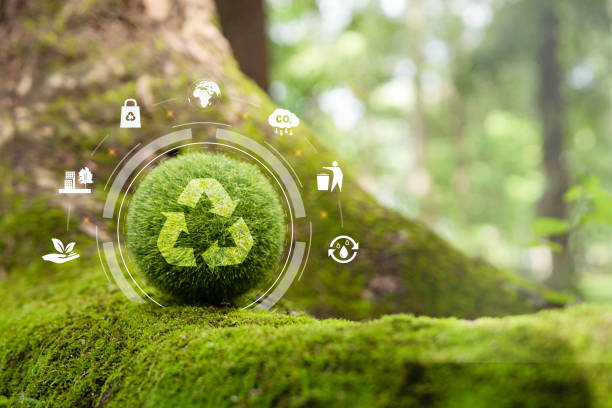From Khilafah to Circularity: How Islamic Teachings Inspire Waste Reduction

Welcome to the enlightening concept of the circular economy! Picture a world where waste is a thing of the past, and everything we use is recycled, reused, or repurposed. This idea aligns with the Sunnah of the Prophet Muhammad (peace be upon him) who exemplified mindful consumption and respect for resources. Just as the circular economy encourages us to shift away from the traditional linear model of take, make, and dispose, Islam teaches us to be stewards of the Earth, promoting sustainability and gratitude for what we have. By adopting a sustainable mindset, we not only honour our resources but also embody the values of care and responsibility that are central to our faith, paving the way for a healthier planet for future generations.
Yet, amidst this vision, we find ourselves in a world of overwhelming choice, particularly in supermarkets. While having options can be beneficial, the sheer abundance often leads to confusion and waste. Why is it that many products are wrapped in plastic, creating unnecessary waste that ultimately ends up in landfills and oceans? This excessive packaging not only contributes to environmental degradation but also obscures the true value of the food within.
Moreover, consider the fate of produce that fails to meet the supermarkets’ stringent cosmetic standards. A strawberry that is slightly misshapen or a carrot with an unusual curve is often deemed unworthy of the shelf, despite being just as delicious and nutritious as its perfectly formed counterparts. This focus on appearance not only leads to significant food waste but also perpetuates a cycle of overconsumption and disposability.
By embracing the principles of the circular economy, we can challenge these norms and advocate for a more sustainable approach to consumption. In doing so, we not only honour our resources but also align our practices with the teachings of stewardship found in our faith.
The circular economy framework is built on three core principles that resonate deeply with our values:
- Design for the Future: This principle emphasises the importance of creating products that are not only functional but also built to last. By focusing on durability, repairability, and recyclability, we can ensure that our resources are used efficiently and responsibly. Imagine a world where products are designed with their entire lifecycle in mind.
- Emphasising Renewable Resources: The circular economy encourages the use of renewable materials and energy sources, reducing our reliance on finite resources. This aligns with the idea of being mindful stewards of the Earth, ensuring that we leave a positive legacy for future generations. By choosing products made from sustainable materials, we contribute to a healthier planet.
- Systems Thinking: Understanding the interconnectedness of various systems—economic, social, and environmental—is crucial. The circular economy invites us to think holistically about our consumption habits and their broader impact. This perspective encourages collaboration and innovation, fostering a community spirit that benefits everyone.
Embracing this framework allows us to transform our consumption and production habits, leading to a more sustainable and equitable future. It invites everyone to be mindful of their choices and their impact on the world.
Here are some tips to help you embrace the circular economy in your daily life:
- Utilise SaaS Platforms: Software as a Service (SaaS) refers to cloud-based applications that allow users to access software via the internet without the need for physical installations or updates. By leveraging SaaS tools for various needs—such as project management, design software, or accounting—you can significantly reduce electronic waste associated with traditional software.
- Clothing Rental Services: Beyond swapping clothes with friends, consider subscribing to clothing rental services. These platforms allow you to wear high-quality outfits for special occasions without the need to purchase new items, thus reducing textile waste.
- Tool Libraries: Instead of buying tools for one-time projects, check if there are tool libraries in your area. These allow you to borrow tools, promoting sharing and reducing the need for individual ownership.
- Digital Product Sharing: Explore platforms that allow you to share or lend digital products, like e-books or software licenses, with friends or family. This encourages a sharing economy and reduces the need for multiple purchases of the same item.
- Upcycling Workshops: Host or attend workshops focused on upcycling. This can turn old items into something new and useful, promoting creativity and sustainability.
- Local Repair Cafés: Participate in or support local repair cafés where community members can bring items to be fixed instead of discarded. This encourages a culture of repair over replacement.
- Sustainable Subscription Boxes: Look for subscription services that focus on sustainable products. These can introduce you to eco-friendly brands while reducing the impulse to buy unnecessary items.
- Community Fridges: Get involved in or start a community fridge initiative where people can donate excess food. This helps reduce food waste while supporting those in need.
- Educational Initiatives: Participate in or create educational initiatives centred on circular economy principles. By teaching others about sustainable practices and how to implement them in their lives, you can foster a greater understanding of this vital approach. The Ellen MacArthur Foundation is an excellent resource for thought leadership in this space, providing valuable insights and guidance on circular economy strategies..
Ultimately, adopting a circular economy is not just a contemporary concept; it’s a way of life that aligns seamlessly with our Islamic teachings. By decreasing waste and being mindful stewards of our resources, we fulfil our obligations while creating a more sustainable future for all.
By Jubaydah